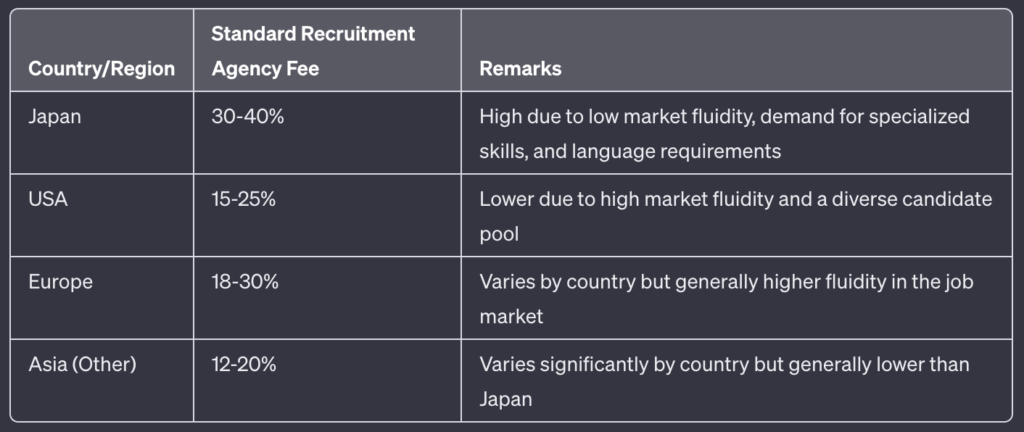Understanding High Recruitment Agency Fees in Japan: A Guide for Foreign Enterprise Software Companies
INDEX

[For Prospective Client Companies]
Welcome to our latest article, specifically crafted for foreign enterprise software companies looking to expand in Japan. In this piece, we delve into the pivotal role of recruitment agencies in navigating Japan’s unique job market and explain why their services are particularly vital for businesses like yours planning to enter this dynamic market.
Introduction
The role of recruitment agencies in Japan’s job market
In Japan, recruitment agencies play a pivotal role in bridging the gap between companies and potential employees. These agencies are not just facilitators of employment but also act as strategic partners for businesses, especially in specialized sectors like enterprise software. In a market characterized by a high demand for skilled professionals and a relatively low unemployment rate, these agencies provide a crucial service in identifying and securing top talent.
Purpose of the Article
This article aims to shed light on a question that many companies in Japan, especially those new to the market, may have: Why are agency fees in Japan significantly higher compared to other countries? By exploring various facets of the Japanese recruitment landscape, including cultural, economic, and market dynamics, this article will provide insights into the rationale behind the pricing structures of recruitment agencies in Japan. Understanding these factors is essential for companies to appreciate the value that these agencies bring to their talent acquisition strategies and overall business growth.
Overview of Japan’s Recruitment Market
Low Market Fluidity
Japan’s job market is characterized by its low fluidity. Unlike many Western countries, where changing jobs frequently is common, in Japan, long-term employment is still a prevailing norm. This cultural inclination results in fewer active job seekers at any given time, making the recruitment landscape more challenging for companies looking for new talent.
Scarcity of English-speaking Candidates
Another distinctive feature of the Japanese job market is the scarcity of candidates proficient in English. While English language skills are gradually improving among the workforce, the pool of bilingual candidates, especially those comfortable in both business Japanese and English, remains limited. This is particularly critical in sectors like technology and international business, where global communication is key.
Demand for Specialized Skills
The demand for specialized skills, especially in industries like technology, finance, and healthcare, has been steadily growing in Japan. As companies undergo digital transformation and embrace new technologies, the need for highly skilled professionals in these areas intensifies. However, the availability of such specialized talent is often not sufficient to meet the demand, leading to a competitive and challenging recruitment environment.

International Comparison
Agency Fee Standards: Japan vs. Other Key Markets
Comparative Fee Structures
While Japan’s recruitment agencies typically charge around 35%, this rate is higher compared to Singapore’s average of 15% and the 15-25% range seen in Western countries. This disparity is influenced by Japan’s specific market conditions, including intense competition for a limited pool of bilingual and specialized talent.

Recruitment Culture and Market Dynamics
Cultural and Economic Factors
Japan’s focus on long-term employment and lower turnover rates contrasts with the more dynamic markets of Singapore and the West. These cultural and economic differences significantly impact recruitment strategies and fee structures.
Language Proficiency and Communication Requirements
Bilingual Skills for Business Success in Japan
In Japan, bilingual skills are critically important, with native-level Japanese needed for client interactions and English for internal communication within foreign enterprises. This dual language requirement is a key factor in the recruitment process’s complexity and the associated costs, setting Japan apart from markets like Singapore, where English is more prevalent in business.
Reasons for High Fees in Japan
Challenges in the Recruitment Environment
Market Fluidity and Specialized Skills
Japan’s job market is marked by low fluidity and a high demand for specialized skills, making the recruitment process lengthy and complex.
Language Proficiency and Cultural Fit
Difficulties in Mastering Japanese
Japanese is ranked as a particularly difficult language for English speakers to learn, as noted by Effective Language Learning. This language barrier is a significant hurdle in recruitment, as many positions require native-level Japanese for client interactions and fluent English for internal communications in foreign companies
Navigating Japanese Business Culture
Aligning with Cultural Expectations
Japanese business practices are characterized by unique cultural nuances. Recruitment agencies must ensure candidates are not only technically qualified but also a cultural fit, further contributing to the complexity and cost of the recruitment process.

Background of Pricing in Japanese Recruitment Agencies
Specialized Talent Acquisition and LinkedIn Usage
The challenge of acquiring specialized talent, particularly bilingual candidates, is a major contributor to higher agency fees in Japan. This process is compounded by the low usage rate of LinkedIn and other professional networking platforms in Japan, making it more difficult to source and connect with potential candidates. Agencies must therefore invest more in alternative methods of recruitment, such as extensive networking, direct outreach, and advertising, which all increase operational costs.
High-Quality Service and Customized Solutions
Japanese recruitment agencies are dedicated to providing high-quality services and customized solutions to meet the specific needs of each client. This involves a deep understanding of the client’s industry, company culture, and the specific role’s requirements. Developing and executing these tailored recruitment strategies requires significant investment in terms of time and expertise, contributing to the higher fees.
Market Dynamics and Operational Costs
The general market dynamics in Japan, including the high cost of living and doing business, also influence agency fees. Operational expenses such as office space, staff salaries, and investments in technology and training are typically higher in Japan. The competitive nature of the recruitment industry further necessitates continuous investment in marketing and brand positioning, which are reflected in the pricing.
Case Studies: Success in Recruiting for Foreign Enterprise Software Companies in Japan
Overview
This section showcases how our agency has successfully navigated the unique challenges of recruiting for foreign enterprise software companies in Japan. These case studies demonstrate our proficiency in sourcing specialized talent and adapting to the specific needs of international businesses in the Japanese market.
Detailed Case Studies
Recruiting Specialized Tech Talent for a US-based Software Company
- Background: A foreign enterprise software company was looking to establish its R&D center in Japan but struggled to find skilled software engineers with experience in cloud computing.
- Agency’s Role: Utilizing our in-depth understanding of the tech industry and local market dynamics, we conducted a targeted search for candidates with the desired technical expertise and international exposure.
- Outcome: Successful placement of key personnel, enabling the company to kickstart its R&D operations effectively in Japan.
Building a Bilingual Team for Global Collaboration
- Background: A multinational software company needed a bilingual team in Japan for its global software development projects.
- Agency’s Role: Acknowledging the scarcity of bilingual IT professionals in Japan, we expanded our search to include passive candidates and leveraged our international networks.
- Outcome: Formation of a proficient bilingual team that facilitated seamless collaboration between the company’s Japanese and global teams.
Overcoming Recruitment Challenges for a Start-Up
- Background: A start-up under a foreign enterprise software company was facing challenges in recruiting a diverse team due to the low LinkedIn usage in Japan.
- Agency’s Role: We employed alternative strategies, including local industry meetups and collaborations with Japanese universities, to tap into the untapped talent pool.
- Outcome: Assembling a diverse and innovative team, well-suited to the dynamic environment of a start-up, while fulfilling the specific needs of a foreign enterprise.
Testimonials: Voices from Leaders in Foreign Enterprise Software Companies in Japan
Overview
This section presents a collection of testimonials from leaders and key figures of foreign enterprise software companies who have successfully expanded in Japan with our recruitment agency’s assistance. These testimonials provide firsthand accounts of the value and impact of our services in meeting the unique challenges of the Japanese market for international businesses.
Testimonials
1. Country Manager, Global Software Company
Navigating the complexities of the Japanese market was a major hurdle in our expansion. The expertise and network of this agency were instrumental in assembling a team that not only possessed the necessary technical skills but also a deep understanding of the local business culture. Their support has been crucial in our successful market entry.
2. HR Director, Multinational Software Firm
As an international company, breaking into the Japanese market required more than just finding the right talent; it required insights into a very different business culture. This agency provided us with exceptional candidates and invaluable guidance on the nuances of Japanese corporate practices, helping us build a team that aligns with both our global objectives and local market needs.
Conclusion and Outlook
Emphasizing the Role of Recruitment Agencies in Japan’s Unique Market
This article has explored the various factors that contribute to the high fees of recruitment agencies in Japan, particularly for foreign enterprise software companies looking to expand in this unique market. From the challenges of sourcing specialized and bilingual talent to navigating the cultural nuances of the Japanese business environment, these agencies play a crucial role in facilitating successful market entries and expansions.
The Value of Specialized Recruitment Expertise
Our examination of case studies and client testimonials underscores the value that specialized recruitment agencies bring to foreign businesses in Japan. These agencies offer more than just recruitment services; they provide strategic insights, local market expertise, and the ability to bridge cultural gaps, which are essential for foreign companies to thrive in Japan.
Looking Ahead
Looking to the future, the role of recruitment agencies in Japan is likely to become even more significant. As the demand for specialized talent continues to grow and the Japanese market becomes increasingly integrated into the global economy, the expertise of these agencies will be indispensable. They will continue to be vital partners for foreign enterprises, helping them navigate the complexities of the Japanese market and contributing to their success.
Closing
As we wrap up our discussion on the critical role of recruitment agencies in Japan for foreign enterprise software companies, it’s evident that these agencies are more than just intermediaries. They are essential partners in overcoming the unique challenges of the Japanese market and securing the right talent.
For those considering a venture into Japan’s dynamic market, these agencies offer invaluable insights and support. If your company is looking to expand in Japan and needs guidance in navigating this unique landscape, feel free to reach out to us at agency@challengerbase.co.jp for expert assistance.
Thank you for exploring the intricacies of Japan’s recruitment market with us. We look forward to being a part of your success story in Japan.